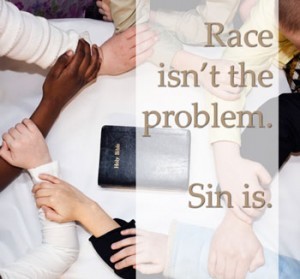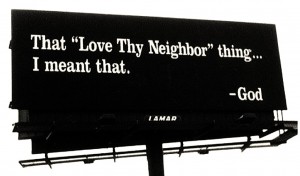 The past couple of weeks have demonstrated that we still have a long way to go when it comes to race relations in our nation. On the one hand, we celebrated the anniversary of the Selma march, an event that brought to the forefront of the nation’s consciousness the brutality of Jim Crow laws and the attitudes that supported those laws. While that march was violently and heartlessly suppressed, it helped bring about the passage of the Voting Rights Act of 1965. On the other hand, we heard reports of a fraternity at the University of Oklahoma singing an overly racist song, advocating lynching over allowing black members. Swiftly, the president of the university removed the fraternity from campus and expelled the leaders of the song. Despite the fact that relations between different racial groups has gotten better over the past few decades, prejudices and out- right racism still exist, perhaps more pervasively than we’d like to admit. Even within the Church we can find evidences of a divide. Truly multicultural churches are few and far between.
The past couple of weeks have demonstrated that we still have a long way to go when it comes to race relations in our nation. On the one hand, we celebrated the anniversary of the Selma march, an event that brought to the forefront of the nation’s consciousness the brutality of Jim Crow laws and the attitudes that supported those laws. While that march was violently and heartlessly suppressed, it helped bring about the passage of the Voting Rights Act of 1965. On the other hand, we heard reports of a fraternity at the University of Oklahoma singing an overly racist song, advocating lynching over allowing black members. Swiftly, the president of the university removed the fraternity from campus and expelled the leaders of the song. Despite the fact that relations between different racial groups has gotten better over the past few decades, prejudices and out- right racism still exist, perhaps more pervasively than we’d like to admit. Even within the Church we can find evidences of a divide. Truly multicultural churches are few and far between.
Many may look at events such as the one at Oklahoma or the current segregated nature of our churches and ask, “In our enlightened age, how can this still be?” We have tried several methods to try to overcome this: greater education, forced integration, and legal sanctions, to name a few. Yet we still seem to be struggling with attitudes towards those who look different than ourselves. If we boil it down to its essence, we could say that racial prejudice is a failure to love our neighbors as ourselves. We see “them,” and “they” are completely different than we are. Perhaps they dress differently, listen to different music, speak a different language, or eat different foods. The emphasis always seems to be on the differences. Jesus reminds us, though, that regardless of our perceived differences, we are neighbors one to another, and that relationship brings with it a command (not an option!) from God: “You shall love your neighbor as yourself” (Matt. 22:39). This follows Jesus’ identification of the greatest commandment (“You shall love the Lord your God with all your heart and with all your soul and with all your mind”), and He says that loving your neighbor is like the greatest commandment . It makes sense when you remember that every person is one of God’s image bearers. There is a reason that Jesus speaks so strongly against hate: hatred of a person necessarily includes hatred towards the image of God in them. I encourage you to search your hearts this week, asking the Spirit to reveal any prejudices you might have, and repent of them.
On Wednesday of this coming week, our prayer journal topic is for racial reconciliation within the Church. It has often been said that Sunday mornings is one of the most segregated times in America. This ought not be! Revelation 7:9-17 paints a beautiful picture of a multiethnic multitude praising God in unison, side by side. This is what Heaven is going to be like. I think we would be blessed if we started acting like that here and now. Just something to think about…
~Pastor Roy
0 Comments